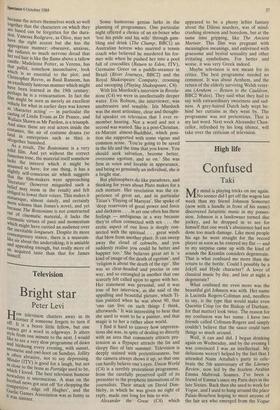Television
Bright star
Peter Levi
How television chatters away in its
corner if someone forgets to turn if off. It is a brave little fellow, but one Cannot get a word in edgeways. It alters Style from one minute to the next. I would like to see a very slow programme of dawn and birdsong every evening, with sunset, Moonrise and owl-hoot on Sundays. Jollity
Often abrasive, not to say depressing. Minder (ITV) is good for a laugh, but not as close to the bone as Porridge used to be, Which I loved. The best television humour nowadays is unconscious. A man on the football news got sent off 'for chopping the competitive edge off Hughes', and the Gaelic Games Association was as funny as
it was sinister.
Some humorous genius lurks in the planning of programmes. One particular night offered a choice of an ex-boxer who 'lost his pride and his wife' through gam- bling and drink (The Champ, BBC1) an Australian heiress who married a tennis coach who believed he murdered his for- mer wife when he pushed her into a pool full of crocodiles (Return to Eden, ITV), Germaine Greer on a paddle-steamer in Brazil (River Journeys, BBC2) and the Royal Shakespeare Company, crooning and swooping (Playing Shakespeare, C4).
With Iris Murdoch's interview in Revela- tions (C4) we were in intellectually deeper water. Eric Robson, the interviewer, was unobtrusive and sensible. Iris Murdoch was the most articulate, clear and thought- ful speaker on television that I ever re- member hearing. Not a word and not a second was wasted. She is a post-Christian, ex-Marxist almost-Buddhist, which posi- tion she supported with some vigour and common sense. 'You're going to be saved in the life and the time that you know. You should seek salvation, become better, overcome egotism, and so on.' She was firm in voice and lovable in appearance, and being so genuinely an individual, she is a bright star.
But philosophers do like paradoxes, and thinking for years about Plato makes for a rich mixture. Her revelation was the ex- perience of great art, and in particular Titian's 'Flaying of Marsyas'. She spoke of 'deep reservoirs of great power and force and darkness. . . in art one often has these feelings — ambiguous in a way because they're often connected with sex . . . the erotic aspect of our lives is deeply con- nected with the spiritual . . . great winds that blow from another place. It can sweep away the cloud of cobwebs, and you suddenly realise you could be better and happier too.' She believes great art is 'a kind of image of the death of egotism', and 'religion is about the death of the ego'. She was so clear-headed and precise in one way, and so entangled in another that one scarcely felt called upon to agree with her. Her statement was personal, and it was true of her interview, as she said of the appalling and beautiful picture, which Ti- tian painted when he was about 90, that 'one can live on such things I think, afterwards.' It was interesting to hear that she used to want to be a painter, and that magic is to her a rather alien world.
I find it hard to convey how unpreten- tious she was, in spite of dealing so directly with an area that commonly attracts pre- tension as a flypaper attracts the fat and sleepy flies of late summer. Television is deeply stained with pretentiousness, but
the camera always shows it up, so that one can hardly believe one's eyes. Union World
(C4) is a terribly pretentious programme, from the carefully preserved quiff of its presenter to the prophetic intonations of its
journalists. Their attack on David Dim- bleby, , in which he was given no right of reply, made one long for him to win. Alexander the Great (C4) which appeared to be a phony leftist fantasy about the Dilessi murders, was of mind- crushing slowness and boredom, but at the same time gripping, like The Ancient Mariner. This film was pregnant with meaningless meanings, and enlivened with gruesome and bestial sexuality and other irritating symbolisms. For better and worse, it was very Greek indeed.
Maybe television is not meant for its critics. The best programme needed no comment. It was about Arnhem, and the return of the elderly surviving Welsh veter- ans (Arnhem — Return to the Cauldron, BBC2 Wales). They said what they had to say with extraordinary sweetness and sad- ness. A grey-haired Dutch lady wept be- hind her curtains as they went by. The programme was not pretentious. That is my last word. Next week Alexander Chan- cellor, refreshed by his long silence, will take over the criticism of television.














































 Previous page
Previous page